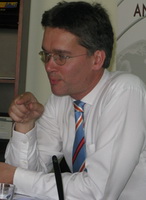World Bank's “Russian Economic Report” presented at CASE
 The recovery in Russia remained steady during the last year. In comparison to other group of countries such as emerging economies or high income OECD countries where recovery slowed down, Russia performed well. Kaspar Richter, World Bank’s lead economist for the Russian Federation and Country Sector Coordinator in the Poverty Reduction and Economic Management Network in the Europe and Central Asia Region presented the Russian Economic Report of Spring 2012 at CASE today.
The recovery in Russia remained steady during the last year. In comparison to other group of countries such as emerging economies or high income OECD countries where recovery slowed down, Russia performed well. Kaspar Richter, World Bank’s lead economist for the Russian Federation and Country Sector Coordinator in the Poverty Reduction and Economic Management Network in the Europe and Central Asia Region presented the Russian Economic Report of Spring 2012 at CASE today.
However, Russia’s growth rate is volatile due to its dependence on oil. Moreover, the rebound since the 2008 crisis is weak; far below the rebound from the crisis in 1998, especially when it comes to fixed investments and exports. Low level of FDI and high capital outflows are also disturbing.
As stated by Richter, economic policies can moderate risks by shoring up macroeconomic stability, and bolster growth by lifting structural barriers. Fiscal policy should focus on lowering non-oil fiscal deficits and delinking expenditures from oil price volatility. It is even more important because of the current high oil price level that currently is not expected to grow sharply. On the other hand, monetary policy should focus on low inflation and allow greater exchange rate flexibility at the same time.
Finally, Russia, after 18 years of negotiations, is about to join WTO this summer. This will definitively bring GDP gains because of lower tariffs and other commitments. They are expected to be around 3.3% of GDP in the medium-term; 11% of GDP in the longer-term.
The World Bank’s RER produces two growth scenarios for Russia (depending on the oil price): baseline with the 3,5% GDP growth in 2012 and high oil price with 4% GDP growth.
Released on March 27th 2012, the full report is available at World Bank website.

